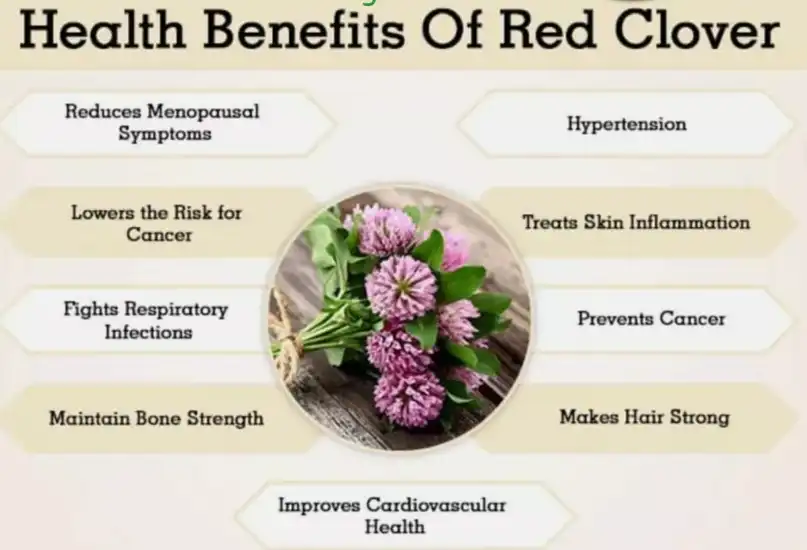
What are the specific benefits of red clover isoflavones for menopausal women?
Red clover isoflavones offer several potential benefits for women experiencing menopause symptoms. These plant-based compounds have been studied extensively for their ability to mimic the effects of estrogen in the body, potentially helping to alleviate some of the most common and bothersome menopause symptoms.
One of the primary benefits of red clover isoflavones is their potential to reduce hot flashes and night sweats. These vasomotor symptoms are among the most frequently reported and disruptive aspects of menopause. Several studies have shown that women taking red clover isoflavone supplements experienced a significant reduction in the frequency and severity of hot flashes compared to those taking a placebo. For example, a randomized, double-blind, placebo-controlled study published in the journal Maturitas found that women taking 80 mg of red clover isoflavones daily for 90 days experienced a 44% reduction in hot flashes, while the placebo group only saw a 16% reduction.
Another important benefit of red clover isoflavones is their potential to support bone health. As estrogen levels decline during menopause, women become more susceptible to bone loss and osteoporosis. Red clover isoflavones may help maintain bone density by promoting bone formation and reducing bone resorption. A study published in the American Journal of Clinical Nutrition found that postmenopausal women taking red clover isoflavone supplements for one year showed significantly less bone loss in the spine compared to those taking a placebo.
Red clover isoflavones may also help improve cardiovascular health in menopausal women. The decline in estrogen during menopause is associated with an increased risk of heart disease and unfavorable changes in lipid profiles. Some studies suggest that red clover isoflavones may help improve cholesterol levels and arterial health. A meta-analysis published in the journal Climacteric found that red clover isoflavone supplementation was associated with significant improvements in total cholesterol, LDL cholesterol, and triglyceride levels in menopausal women.
Additionally, red clover isoflavones may help alleviate vaginal dryness and improve skin health. The estrogenic effects of these compounds can help maintain the elasticity and moisture of vaginal tissues, potentially reducing discomfort during intercourse. Some women also report improvements in skin texture and hydration when using red clover isoflavone supplements, which may be due to the compounds' ability to support collagen production and skin elasticity.
How does red clover compare to other natural remedies for menopause symptoms?
When considering natural remedies for menopause symptoms, it's important to compare red clover isoflavones to other popular options to understand their relative efficacy and potential advantages. Red clover is often compared to other phytoestrogen-rich plants, such as soy, black cohosh, and evening primrose oil, as well as lifestyle interventions and herbal remedies.
Compared to soy isoflavones, red clover isoflavones have a slightly different composition of phytoestrogens. While both contain genistein and daidzein, red clover also contains significant amounts of biochanin A and formononetin. Some studies suggest that this unique combination may make red clover more effective for certain menopause symptoms. For example, a comparative study published in the journal Gynecological Endocrinology found that red clover isoflavones were more effective than soy isoflavones in reducing hot flashes and improving bone mineral density in postmenopausal women.
Black cohosh is another popular herb used for menopause symptom relief. While both red clover and black cohosh may help with hot flashes, they work through different mechanisms. Black cohosh is thought to act on serotonin receptors, while red clover provides phytoestrogens. Some women may find that one works better for them than the other, or they may even use them in combination. A study published in the journal Menopause found that a combination of red clover and black cohosh was more effective in reducing menopausal symptoms than either herb alone.
Evening primrose oil is often used for breast pain and hot flashes associated with menopause. While it may provide some relief, the evidence for its effectiveness is less robust than for red clover isoflavones. Red clover may offer a broader range of benefits due to its estrogenic effects, potentially addressing more symptoms simultaneously.
Lifestyle interventions, such as regular exercise, stress reduction techniques, and dietary changes, are essential components of managing menopause symptoms. Red clover isoflavones can be used in conjunction with these approaches for a comprehensive management strategy. For example, combining red clover supplementation with a diet rich in fruits, vegetables, and whole grains may provide synergistic benefits for bone health and cardiovascular risk reduction.
It's worth noting that while red clover isoflavones show promise for many menopause symptoms, individual responses can vary. Some women may find greater relief with red clover, while others may respond better to different remedies or a combination approach. Consulting with a healthcare provider can help determine the most appropriate treatment strategy based on individual symptoms, health history, and preferences.
Are there any potential side effects or interactions with red clover isoflavones?
While red clover isoflavones are generally considered safe for most women, it's important to be aware of potential side effects and interactions. As with any supplement or medication, individual responses can vary, and some women may experience adverse effects or find that red clover interacts with other medications or health conditions.
One of the primary considerations when using red clover isoflavones is their potential estrogenic effects. While these effects are generally beneficial for menopausal symptoms, they may be contraindicated for women with a history of hormone-sensitive cancers, such as some types of breast cancer. The American Cancer Society advises caution for women with a history of breast cancer or those at high risk for developing it. It's crucial for these women to consult with their oncologist or healthcare provider before using red clover supplements.
Some women may experience mild digestive side effects when taking red clover isoflavones, such as bloating, gas, or nausea. These symptoms are usually temporary and often resolve as the body adjusts to the supplement. Starting with a lower dose and gradually increasing it can help minimize these effects.
There is also a theoretical concern about the interaction between red clover isoflavones and blood-thinning medications, such as warfarin. Red clover contains small amounts of coumarin, which could potentially enhance the effects of anticoagulant drugs. While clinical evidence of significant interactions is limited, it's advisable for women taking blood thinners to consult their healthcare provider before using red clover supplements.
Some studies have raised questions about the long-term safety of high-dose isoflavone supplements, particularly concerning endometrial health. However, most research suggests that red clover isoflavones do not increase endometrial thickness or cancer risk when used at recommended doses for typical durations. A systematic review published in the journal Menopause found no significant adverse effects on endometrial health with red clover isoflavone use.
It's important to note that the quality and standardization of red clover supplements can vary. Choosing products from reputable manufacturers and following recommended dosages is crucial for safety and efficacy. Additionally, as with any supplement, it's wise to inform all healthcare providers about the use of red clover isoflavones to ensure comprehensive care and avoid potential interactions with other treatments.
While red clover isoflavones offer promising benefits for menopause symptom relief, they are not a one-size-fits-all solution. Some women may not experience significant benefits, while others may find them highly effective. The variability in response underscores the importance of personalized approaches to menopause management and the need for ongoing communication with healthcare providers.
Conclusion
Red clover isoflavones represent a valuable option in the toolkit for managing menopause symptoms. Their potential to alleviate hot flashes, support bone health, and offer cardiovascular benefits makes them an attractive natural alternative for many women. However, as with any health intervention, it's essential to approach their use thoughtfully, considering individual health status, potential interactions, and the guidance of healthcare professionals. By doing so, women can make informed decisions about incorporating red clover isoflavones into their menopause management strategy, potentially enhancing their quality of life during this significant life transition.
If you are also interested in this product and want to know more product details, or want to know about other related products, please feel free to contact lea_slsbio@163.com,WhatsApp+86 13193326505.


